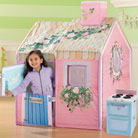by Stacey
The toy company Hasbro has recently gotten stuck in a scary 1950’s time warp. According to commercials for a new toy called Rose Petal Cottage, little girls can play happy homemaker with all the benefits of laundry machines and state-of-the-art kitchens. Thanks to Catherine Price from Salon’s Broadsheet for the tip. She explains:
According to the commercials, one of the best parts of the Rose Petal Cottage is that it gives your little angel a chance to practice her home-decorating skills. I’m not kidding. Click on the video link, check out the one called “Dreamtown for Moms,” and watch as the toddler rearranges her sofa and crib, presumably to make room for a teddy bear muffin party.
I’m not saying that we shouldn’t encourage kids — both boys and girls — to dream of having their own homes, families and baking sets. I’m just surprised at how unabashedly anachronistic this one seems — I mean, couldn’t you balance out the scene of her doing laundry with a shot of a pretend computer? Or a desk? Or maybe, I don’t know, a book?
I have to admit, I like rearranging the furniture as much as the next gal, messing with my home decor if you will. But here’s where I draw the line: “In the commercial called “Dreamtown for Kids,” an overly enthusiastic singer croons, ‘I love when my laundry gets so clean/ Taking care of my home is a dream, dream, dream!'” Sorry, but singing about the laundry just isn’t credible in my book. Thankfully Price adds this verse: “Rose Petal Cottage is so pink, pink, pink/ As a toy for girls, it stinks, stinks, stinks!”
Hasbro doesn’t stop at stereotyping little girls. They’ve also got some new marketing for their line of Tonka trucks that’s based on the tag line “Boys: They’re just built different.” Again, Price explains:
In the ad, a little boy presents his bemused mother with a bouquet of flowers he has pulled out of the lawn and then tramps back outside, leaving a trail of dirt in his wake. The ad continues with scenes of little boys riding through the house on their Tonka trucks as the narrator explains reasons that the trucks are perfect for boys. “With the Tonka Scoot N’ Scoop, they can play their way,” she says. “It’s built around what he does naturally.”
What exactly is it that boys do naturally? According to the commericial, riding through the house on a toy truck chasing the family dog and busting through a pile of pillows presumably set in place on the floor by mom. Or as Price puts it, “whatever the hell they want.” She adds: “It’s quite a different scene from the muffin-baking, home-decorating, laundry-doing world of responsibility going on in the Rose Petal Cottage.”
Price is careful not to bash the idea that boys like to play with trucks or girls like to play with playhouses. And of course, that’s true to some extent. My son woke up one morning in love with garbage trucks and went on to love every other truck on the road along with anything else that moved through space via wheels, engines, sails, or motors. That boy loves him some transportation.
But he also loves to bake and cook. He’s psyched about the new kid-sized broom we just got him. And he’s very gentle with his baby brother who he likes to help wash in the tub. He even told me that he likes to play with the dollhouse in the childcare room at my gym.
I wonder what he would think if he saw these ads. Would he decide that just girls play house and just boys play trucks? It would be a reasonable conclusion. The thought of it makes me sad.
I think Price sums it up well. She says that ads have an effect on people’s self-perception and kids are particularly open to learning to want what they’re told they should want. “So I don’t like the fact that while the girl is shown meticulously rearranging her living room furniture, the boy is deliberately messing up the living room as his mother smiles in the background with a look that all but says, “Boys will be boys!” To which I would respond, sure — but boys and girls will also live up to the expectations we place on them. So we’d better be careful what those expectations are.”
What do you all think? Do toys reflect the larger culture? Are our kids going to grow up to be like Ward and June Cleaver? Or are these just a couple of random toys in a sea of plastic fun?

